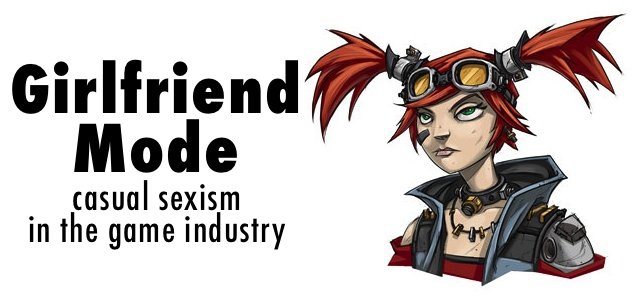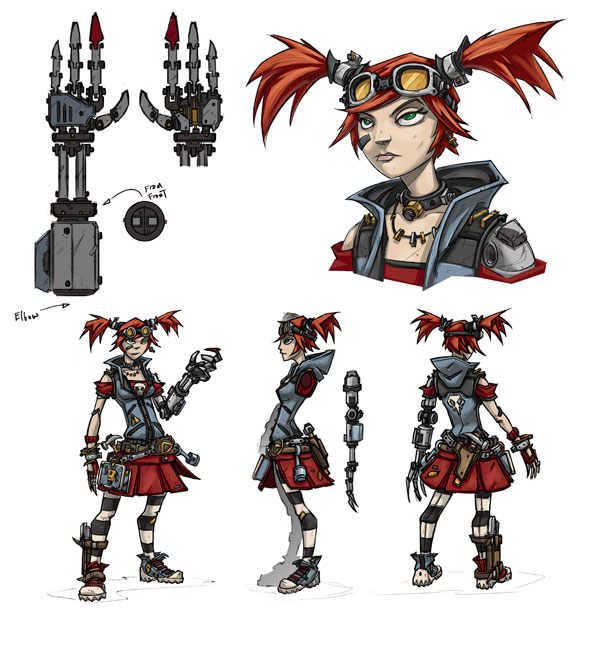


Casual sexism in the game industry may not be as serious a problem as starving to death or being run over by a tank for standing up for your freedom of speech, but in the smaller, narrower context of the industry we’re a part of, it’s an issue that’s come to the forefront of our conversations.
Publicly, it’s no longer acceptable to make jokes about how women suck at video games—and that’s a good thing. Efforts are being made to make video games more inclusive to people from every walk of life, and turning women into the butt of jokes goes not only goes against these efforts—it’s also lame, like the word “lame”, which is totally ableist when used in a pejorative context and serves only to reinforce condescending views on people we deem to be ‘less than’ who we are. But I digress.
 The latest “issue,” as it were, to bring the topic of sexism to the forefront of discussion is the “Girlfriend Mode”, a term used by a Gearbox lead designer to describe a new selection of skills for one of Borderlands 2’s character classes designed to cater to players with a limited skillset—or non-gamers.
The latest “issue,” as it were, to bring the topic of sexism to the forefront of discussion is the “Girlfriend Mode”, a term used by a Gearbox lead designer to describe a new selection of skills for one of Borderlands 2’s character classes designed to cater to players with a limited skillset—or non-gamers.
Officially, the term is “Best Friends Forever,” but internally—and to the press—the game’s lead designer John Hemingway calls it “Girlfriend Mode”, a term so casually sexist in its implication of how women must be bad at videogames that it seemingly dismisses the fact women make up half the population of gamers overall and are every bit as capable of being gamers as their male counterparts.
The ironic thing about "girlfriend mode" is that it's designed to make games more accessible to non-gamers. Instead, the term alienates.
Hemingway himself may not be a sexist chauvinist who twirls his mustache nefariously while thinking up ways to oppress women, but his use of the term (which his boss Randy Pitchford later described as an anecdote in his defense of Hemingway) was so casually thrown out and used “for the lack of a better term” (his words) that it goes on to propagate the stereotype that women are bad at games—or is perhaps a product of that stereotype, which often remains unquestioned and unaddressed by the community at large. As I said, Hemingway may not be a sexist, but when terms like those go unaddressed, it allows sexist stereotypes to blossom like big smelly rafflesia flowers, stinking up the place. Have you ever smelt a rafflesia? They’re called corpse flowers, and for good reason.
Gearbox itself may give off the impression that it has a relatively immature staff which goes ahead and shoots its mouth off to the press without first examining the language they use—but they’re hardly the only studio to harbor internalized sexism. It’s not even an issue that’s explicitly tied to the game industry, either. It’s a larger, social issue that requires constant addressing. The fight doesn’t end just because Gearbox got stamped with the “sexist” label, and it doesn’t help to single out the studio for what just about everyone else is also doing.
It’s too convenient to follow the narrative that game companies like Gearbox are responsible for all the sexism in the community because it alleviates our burden to look inward and deal with the problem of sexism as a whole.
That said, it doesn’t mean Gearbox should get a free ticket from being “called out” for using the term. Instead, their use of the term should be treated as a symptom and not a cause—and a reason for us to ask bigger questions and tackle sexism on a larger scale without demonizing an entire studio over a gaffe.




 Far Cry 3 Secrets and Easter Eggs: The Islands Hide Many Mysteries
Far Cry 3 Secrets and Easter Eggs: The Islands Hide Many Mysteries Witcher 3: Hearts of Stone – How to Beat the Ofieri Mage
Witcher 3: Hearts of Stone – How to Beat the Ofieri Mage 5 Accessories You Should Get To Make Xbox One Ownership Better
5 Accessories You Should Get To Make Xbox One Ownership Better Alchemy Mysteries: Prague Legends Walthrough (Text)
Alchemy Mysteries: Prague Legends Walthrough (Text) Minecraft (PC) Update 1.9 - Combat against the Ender Dragon
Minecraft (PC) Update 1.9 - Combat against the Ender Dragon